#attica ny
Explore tagged Tumblr posts
Video
youtube
The Attica Prison’s inmate-led riot turns the prison into a democracy
Attica was a pot simmering and waiting to boil over for decades. finally on 9/9/71 it happened. Nelson Rockerfeller and the new york state troopers caused a situation that became unforgettable in american history. the massacre all occured because they refused to bargain with the prisoners, on human rights within the institution.
This is why the 13 amendment must be included in the Badges of Slavery or there can be no repair thru Reparations.
#youtube#attica#prison#attica ny#nelson rockerfeller#massacres#new york state police#american history#badges of slavery#The Attica Prison’s inmate-led riot turns the prison into a democracy
5 notes
·
View notes
Text
Celebrating Black Queer Icons:
Miss Major Griffin-Gracy
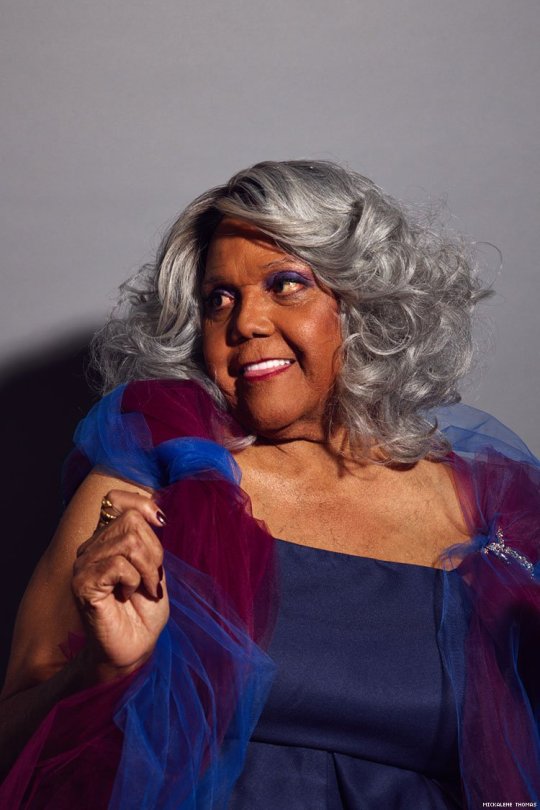
Born on October 25, 1940, Major is a trans women well known as a leader in the broader trans community and an activist, with a particular focus on black and incarcerated trans women. Major grew up in Chicago's South Side and participated in the local drag scene, during her youth. Major described the experiences as glamorous, like going to the Oscars. While she did not have the contemporary language for it, Major has been out as a trans women since the late 1950s. This made her a target of criticism, mistreatment, and violence, even among her queer peers. Majors transition, especially getting her hands on hormones, was largely a black market affair. Given the lack of employment opportunities for black trans women at the time, she largely survived through sex work and other criminalized activities. At some point Major moved to New York City and established herself amongst the cities queer community, despite the prejudice against trans women. She participated in the 1969 Stonewall Uprising. Later, after getting convicted on a burglary charge, Major was imprisoned with men at Clinton Correctional Facility in Dannemora, NY. There she met Frank "Big Black" Smith, a participant in the 1971 Attica Uprising at Attica Correctional Facility. He treated Major, and her identity as a woman, with respect and the two built a friendship. Smith also taught Major a good bit about advocating for herself and other trans women being mistreated by the US Justice System. Major was released from Dannemora in 1974. Major moved to San Diego in 1978 and almost immediately began working on community efforts and participating in grassroots movements. Starting by working at a food bank, she would go on to provide services directly to incarcerated, addicted, and homeless trans women, and would provide additional services after the AIDS epidemic started. In the 1990s Major moved to the San Fransisco Bay Area, where she continued her work, alongside organizations like the Tenderloin AIDS Resource Center. In 2003 Major became the Director of the Transgender Gender Variant Intersex Justice Project, shortly after its founding by attorney and community organizer Alexander L Lee, a trans man. The group works to end human rights abuses in the California Prison System, with a focus on trans, intersex, and gender variant POC. The position has since been passed on to Janetta Johnson, a previously incarcerated trans woman who mentored under Major. She is the focus of the 2015, award winning, documentary Major!. Major has five sons, two biological and three runaways she adopted, after meeting them in a California park. Her oldest son, Christopher was born in 1978, and her youngest, Asiah (rhymes with messiah) in 2021. At 82 years old Miss Major Griffin-Gracy continues to be an active member of her community and an advocate for our rights as trans people.
Haven't settled on which yet, but Willmer "Little Ax" Broadnax or Victor J Mukasa will be next!
#celebrating black queer icons#black history#black history month#black history is queer history#black history is american history#abolish the police#abolish prisons#decriminalize sex work#miss major griffin-gracy#major!#really disappointing to find out she doesnt show up in Popular Tags#stonewall inn#stonewall riots#stonewall uprising#transgender gender variant intersex justice project
352 notes
·
View notes
Note
Can we have your analysis of NY governors since Rockefeller like you did with the NYC mayors.
That's a bit trickier, but sure! (Interesting choice of starting point. No Al Smith, no FDR, no Lehman, no Dewey - that's a lot of famous NY governors out of the picture.)
Governors below the cut, because this one is going to run long.

Nelson Rockefeller (1959-1973):
Certainly a politically successful governor - the man won four elections in a row! - Rockefeller was the last of his kind, the quasi-liberal Northeastern Republican to which he gave his name. At the same time, when you dig into his record, there is as much to be ashamed of as to be proud of.
In the interests of fairness, let's disuss the positives first: Rockefeller believed in taxing and spending on a grand scale, whether that was for public works, state parks, state aid to education (SUNY grew sixfold during his tenure), low-income housing, pensions for public sector workers, mass transit, or Medicaid. On non-spending issues, Rocky was an early supporter of abortion rights, state-level civil rights legislation, the ERA, environmental conservation, and a state-level minimum wage.
When it came to the monuments that he hoped would become his legacy, Rockefeller liked to build big. Unfortunately, when it comes to the negatives of his governorship, they are of a similar scale. Chiefly, the problem was that Rocky was a pretty consistent "law and order" politician - the laws that authorized "stop and frisk" and "no-knock" warrants were passed with his enthusiastic support, state police payrolls and budgets balooned in size, and he was a consistent supporter of the death penalty pretty much until the end.
But when it comes to "law and order," two monuments stand taller than all the others: Attica and the drug laws.
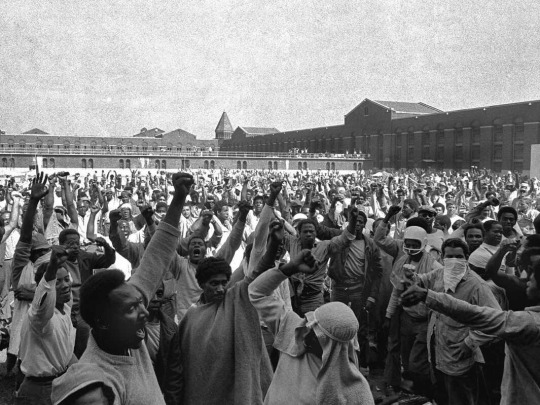
On September 9th, 1971, over a thousand incarcerated men (overwhelmingly men of color) seized control of the Attica Correctional Facility in a protest over living conditions and political rights. They took 42 correctional officers and staff hostages, issued a list of 33 demands, and then negotiated for four days in good faith. Refusing to meet with the inmates and unwilling to either remove the unpopular superintendent or grant amnesty for the uprising, Rockfeller instead sent in the state police, armed corrections officers (for some ungodly reason), and the National Guard and gave them free reign.
On the morning of September 13th, troopers dropped tear gas into the main yard and then just started shooting indiscriminately. In fifteen minutes, 29 inmates were murdered - including most of the uprising's leadership, who were targeted by name for execution - and so were 10 hostages. (Often shooting blindly into the billowing clouds of tear gas with shotguns, the troopers were so undisciplined that they wounded another five corrections officers and one state trooper in friendly fire incidents.) Another 85 inmates were wounded, and hundreds and hundreds of survivors were made to strip naked, crawl through mud and shit and broken glass, and then tortured by corrections officers.
Rockefeller covered all of this up. The governor claimed that the prisoners had committed "cold-blooded killings" of all the hostages, and particularly trapped himself by claiming that the prisoners had slit the throats of the hostages - medical examiners concluded that all of the hostages were killed by law enforcement bullets. Although forced by public opinion to establish a Special Commission to investigate what had happened, Rockefeller did his level best to ensure that the truth of what happened never got out (it did eventually come out, but it took years and many couragous whistleblowers and crusading lawyers to make that happen), to ensure that not a single trooper was held criminally resppnsible, and to avoid as long as possible paying any restitution to the families of the dead, let alone the survivors.
All because he didn't want to look weak on crime.
When it comes to the Drug Laws to which he put his name, it's hard to see them as anything less than a political stunt that ruined the lives of thousands and thousands of people. Rocky had previously supported liberal treatment and social services approaches to drugs, but he wanted to run for the Republican presidential nomination in 1976, so he did a 180 to burnish his "law and order" credentials.
Under his laws, selling as little as two ounces or merely possessing four ounces of opoids, cocaine, or marijuana would be punished with a minimum of 15 years to life and a maximum of 25 years to life. Over the decades since the enactment of the Rockefeller Drug Laws, some 150,000 people would be incarcerated for non-violent drug offenses in New York, over 90% of whom were black or Hispanic men. It took until 2009 for these laws to be dismantled.
All because he wanted to run for president.
Verdict: like Jekyll and Hyde. Both an asshole and not an asshole, depending on the issue.
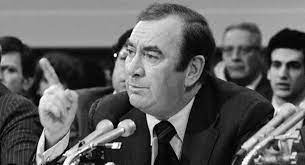
Hugh Carey (1975-1982):
The first Democratic governor of New York in almost 20 years, Carey was elected in the Democratic landslide of 1974. And like a lot of "Watergate baby" Democrats (like one Joseph Robinette Biden), Carey was an odd blend of fiscal conservative and social liberal.
This applied most immediately and most significantly to his handling of New York City's Fiscal Crisis. The city was massively in debt, New York financiers were engaging in a capital strike, the President of the United States was openly hoping for NYC's financial demise in order to punish American liberalism, and the one thing everyone knew and no one wanted to admit is that someone had to pay for a bailout.
As governor, Carey did bail out NYC - but at the cost of the city not only giving the bankers everything they had demanded (public sector layoffs, wage freezes, subway fare hikes, the closure of public hospitals, libraries, and fire stations, and the end of free tuition at CUNY), but also of surrendering the city's fiscal autonomy. As quid pro quo for state funds, Carey pushed through the creation of the Municipal Assistance Corporation (MAC) to handle the city's bonds and the Emergency Financial Control Board (EFCB) to control the city's taxation and budgets. These two unelected bodies continued in existance for decades, and set a precedent for the state government to call the shots when it came to local NYC governance, even while NYC's economy funded the state government.
All this at the same time as Carey was cutting income, capital gains, and corporate taxes for the wealthy, creating the modern suite of tax breaks for developers, and keeping state spending below the rate of inflation. On the flip side, he did build a bunch of fancy public works like the Javits Center, Battery Park City, and the South Street Seaport to attract tourists back to NYC.
However, on social issues Carey was quite progressive. On both the death penalty and abortion rights, he stopped the state legislature from rolling back reforms forced on them by the courts. He made the de-institutionalization of the mentally ill and the provision of community-based services a signature issue - although not enough to prevent a rise in homelessness among the mentally ill. Unlike Rockefeller, he tried to do the decent thing when it came to the aftermath of the Attica Rising by pardoning the rioters. Like Rockefeller, he was in favor of environmental regulation.
Verdict: Mostly an asshole. Meeting baseline expectations for a Democrat doesn't cancel out fucking over NYC for a generation.
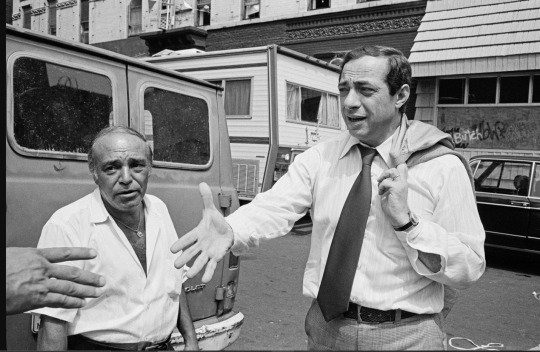
Mario Cuomo (1982-1994):
Writing about Cuomo the Elder is difficult, because for a generation of New Yorkers and others he represented liberal ideals and aspirations tbat were ultimately unconnected to the day-to-day business of governance. This was largely due to the way he exploded into national prominence with his "Tale of Two Cities" speech at the 1984 Democratic National Convention, which challenged the rosy rhetoric of Reagan's "Morning in America."
youtube
The problem is that, as governor, Mario Cuomo stressed "progressive pragmatism" and tried to straddle the line between liberal goals and business-friendly methods. As Saladin Ambar put it in American Cicero, "whereas Rockefeller oversaw a period of tremendous government expansion...Cuomo was later derided for having no big policy focus. His was an era of contraction, one of smaller progressive victories."
When we look at Cuomo's record, we see he prided himself on the "largest tax cut" in New York state history and balancing the budget through cutting spending, but also on expanding Medicaid to low-income children and pregnant women. He lowered the top income tax rate, but also increased the basic welfare grant. He trumpeted $500 million in state aid to education, but also spent $500 million to build new public prisons. He spent $850 million on environmental clean-up efforts, but $300 on paying down state debt.
Ultimately, the issue that defined Cuomo had nothing to do with economic policy or social spending - it was the death penalty. His opposition to the death penalty had cost him the mayoral election in 1977, but it won him the gubernatorial nomination in 1982 - both times in matchups against Ed Koch. As governor, he vetoed 12 different bills to restore New York's death penalty. Ultimately, it would be the issue that brought him down: running for a fourth term in 1994, Pataki attacked Cuomo for his oppositition to the death penalty. Highlighting a horrible case in which a child murder who had inexplicably been allowed to plead down to one count of manslaughter, and who then became a serial killer after serving his time in prison, Pataki hammered Cuomo as being soft on crime and the incumbent ended up winning a grand total of one county north of Yonkers (and losing Staten Island in the process).
Also, I have no patience for Cuomo's "Hamlet on the Hudson" bullshit when it came to seeking the Democratic presidential nomination in 1988 and 1992. If you're going to run, have the guts to say so.
Verdict: I'm not mad, I am disappoint.

George Pataki (1995-2005):
The great irony of the 1994 gubernatorial election is that Pataki would go on to reinstate the death penalty in his first year as governor - only to see the New York Court of Appeals declare it unconstitutional. Pataki prided himself on being "tough on crime," and ended up pushing through 100 laws increasing criminal penalties - which he erroneously claims caused crime rates to decrease.
When it comes to economic policy, Pataki was just as lousy as any other Republican - cutting income taxes on the rich and corporate taxes more than any other governor before him. This at the same time that he cut a million ooor people off of welfare. His commitment to the economic illogical of balanced budgets led him to propose significant spending cuts in 2003 even as New York was still wrestling with the economic fallout of 9/11, only to be overriden by the state legislature.
His social policies were somewhat better. There was a modest expansion of health care for the working poor through SCHIP, he supported gun control, he supported abortion rights, he was in favor of anti-discrimination laws to protect LGBT+ people but opposed gay marriage (which was fairly good for a Republican in the early 2000s), he did put some money into environmental programs. His education policy rather sucked - he was strongly pro-charter schools (boo) and micro-managed CUNY to get rid of remedial education.
Verdict: bit of an asshole, but less so than most Republicans.
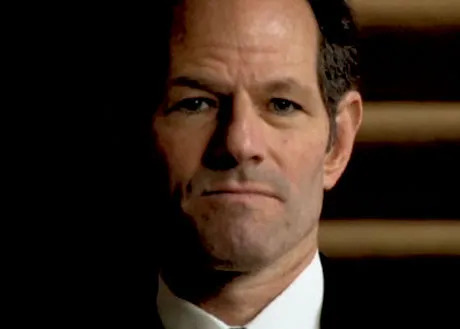
Eliot Spitzer (2007-2008):
It's hard to find much to say about Spitzer's time as governor, because he wasn't around for very long. Elected on the basis of his reputation as a crusading Attorney General, Spitzer came into office saying that he would "change the ethics of Albany." He spent most of his brief time as governor feuding with the (corrupt and convicted if it wasn't for the Supreme Court) leadership of the state legislature. While a lot of his proposals were quite good, Spitzer's "steamroller" strategy was pretty much ineffective in getting legislation passed (hey, turns out the Johnson Treatment is bullshit) and it's hard to point to a major accomplishment of his tenure as governor. But what Spitzer is primarily remembered for is the prostitution scandal that brought him down. As someone who thinks sex work should be legal, my main issue with his behavior is that he was "a real weasel" about not wanting to use condoms and used his money to get his way. This is an occupational health and safety issue for sex workers, being able to insist on condom use and reject clients who refuse to use them is a labor rights issue for sex workers, and clients who try to use their wealth and power to undermine the autonomy of sex workers should be blacklisted.
Verdict: an incompetent and an asshole to sex workers.
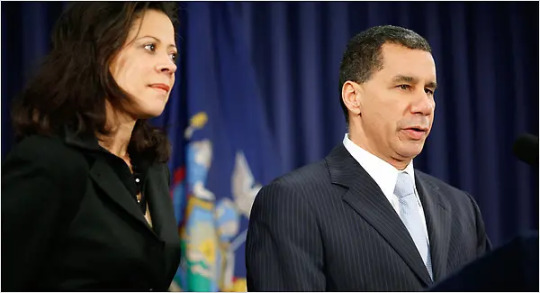
David Paterson (2008-2010):
Suddenly thrust into the limelight after Spitzer's resignation, David Paterson's tenure as governor started extremely unluckily, as both he and his wife admitted to having extamarital affairs the day after his inauguration - something that wouldn't have been as big a deal if it hadn't been for the Spitzer scandal intensifying the level of media scrutiny directed at the personal morality of elected officials.
He then had two weeks to negotiate the state budget at the height of the Great Recession, which hit particularly hard due to the outsized importance of Wall Street to New York's economy and state finances. This was never going to be a good budget, but it was highly noticeable that Paterson's budget leaned heavily on spending cuts rather than using state reserves or taxing the wealthy, while providing significant tax cuts to middle-class and affluent homeowners.
This was rather surprising given Paterson's liberal roots as a former Dinkins staffer. It was similarly surprising that when Paterson was called upon to appoint someone to fill the U.S Senate seat left vacant by Hillary Clinton becoming Secretary of State, that he went with Blue Dog Kirsten Gillibrand rather than Caroline Kennedy (the leading scion of the Kennedy family in New York) or Andrew Cuomo (the heir to his father's legacy). This led to something of a feeling that Paterson was turning out to be something of a liberal in name only.
The main issue where Paterson's liberalism seems to have remained strong was gay marriage, where Paterson did something of an end-run around the deadlocked state legislature by ordering New York State agencies to recognize out of state marriage licenses from same-sex couples. While successful in his efforts, this didn't help Paterson win support within the state legislature for a statutory legalization of gay marriage, and the bill went down to a 38-24 defeat in the State Senate.
Ultimately, however, I think Paterson's tenure as governor was hamstrung by the deadlock in the State Senate, which was evenly split between Democrats and Republicans with no lieutenant governor to break the tie (thanks to some truly stupid decisions by state courts on the issue). While most of the chaos had to do with two truly appalling conservative Democrats going over to the Republican side in exchange for personal considerations and wasn't really Paterson's fault, it did prevent him from achieving many legislative wins ahead of the primary election in 2010 - although two late-breaking scandals really did the fatal damage to his further political hopes.
One unanswered question is to what extent Paterson was knifed by then-Attorney General Andrew Cuomo, either/both in revenge for being overlooked for the U.S Senate and/or to clear the way for Cuomo's 2010 primary run for governor. After all, it was Cuomo who was handling the investigations into Paterson, who torpedoed Paterson's attempt to end the Senate crisis by appointing a new lieutenant governor, and presumably Cuomo who lobbied Obama to persuade Paterson to drop out. Moreover, given Cuomo's later penchant for conservative Democrats enabling Republican control of the State Senate, it's hard to avoid conspiracy theorizing that he had something to do with Monserrate and Espada's parliamentary coup.
Verdict: while Paterson was dealt the worst possible hand when he became governor, he played it badly. Kind of an asshole.
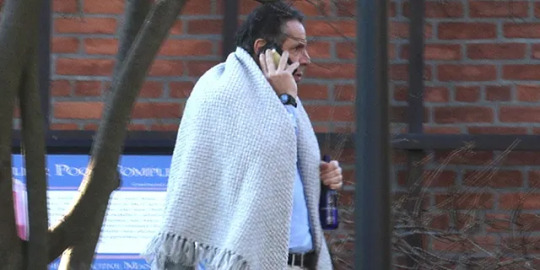
Andrew Cuomo (2011-2021):
In the interests of full disclosure, it's going to be very difficult for me to be objective about Andrew Cuomo since I was involved in several efforts to defeat him for public office and I personally loathe the man. So I'm going to try to focus as much as possible on what he did as governor of New York, because hopefully the focus on concrete actions will keep me from going off the rails.
I think the first thing to start with is that Cuomo deliberately undermined Democratic governance of the state of New York by engineering the formation of the Independent Democratic Conference, a group of conservative Democratic state senator who handed back control of the State Senate to the Republicans after Democrats won control of that chamber in the 2012 election.
Cuomo betrayed his own party and the policy agenda he nominally supported and had run for office on because he didn't want to be pressured by the left wing of the Democratic Party on progressive priorities and preferred to cut "moderate compromises" with the Republican leadership. Cuomo maintained this unholy coalition until it became a stumbling block to his hopes of winning the Democratic presidential nomination, at which point he terminated it just before the IDC's members were swept out of office by an enraged electorate.
As baseline expectations for Democratic elected officials go, I feel that supporting Democratic control of government and opposing conspiracies to hand over control of government to the Republican Party is about the minimum.
The second thing to understand about Cuomo is that while he has a long list of seemingly progressive accomplishments - gay marriage, gun control, marijuana legalization, paid family leave, and a $15 minimum wage, etc. - virtually all of them are cases in which actual progressive groups and elected officials had been pushing for years, where Cuomo had blocked their efforts either through executive inaction or outright opposition to legislation, and where he eventually took credit for compromise measures that repeatedly turned out to have regressive stings in the tail that made them much weaker.
And all of that is before he was brought down by his own manifest corruption, his total incompetence on COVID despite becoming a media darling on the issue, and his long history of sexual harassment and assault.
Verdict: the biggest asshole in New York political history.

Kathy Hochul (2021-present):
Normally, there wouldn't be much to say about a brand-new governor who was unexpectedly elevated to office by their predecessor's resignation in disgrace. For a good while, all that Hochul seemed to aspire to be was "not Andrew Cuomo" - not a bully, not a misogynist, willing to listen to everybody.
More recently, we've learned a bit more who Hochul is through how she's chosen to spend her political capital. In all but one case - building more affordable housing in suburban upstate New York - Hochul has shown herself to be a relentlessly conservative Democrat, who's willing to spend political capital in order to dismantle bail reform or try to get a conservative judge appointed to the Court of Appeal or appoint a Republican to lead the public power utility.
Except the problem for Hochul in her attempt to be Andrew Cuomo but without the misogyny is that Democrats control both houses of the legislature now, and the legislature from the leadership to the rank-and-file is no longer subservient to the governor as they were under Cuomo. When Hochul put up LaSalle for the Court of Appeals, she was repeatedly humiliated by getting stomped in committee and floor votes. When Hochul tried to appoint Justin Driscoll to the New York Power Authority, he was defeated too. And sadly, when Hochul tried to get her housing proposal by including it in the budget, suburban legislators stripped it out.
That's kind of the problem with Hochul: she's not very good when it comes to the core skills of a politician. She's not good at reading the room, otherwise she never would have nominated LaSalle after labor told her that anyone but him would be acceptable. She's not good at counting votes, otherwise she wouldn't have pushed votes on LaSalle and Driscoll and the housing package that she ended up losing by lopsided margins. And she's not very good at campaigning either, otherwise she wouldn't have needed to be bailed out by the progressives at the last minute in the 2022 election.
Verdict: an asshole, but thankfully not as good at being an asshole as Cuomo was.
40 notes
·
View notes
Text


53 years ago Sept 9th 1971 the Attica Uprising began when over 1,200 men incarcerated in upstate NY rose up and took control of the prison to demand basic human rights & dignity. Today the struggle to #ShutDownAttica and free all political prisoners from the US to 🇵🇸 continues.
Sparked by the murder of George Jackson in San Quentin prison in California weeks prior, the Attica rebellion lasted for four days. On Sept 13th under the orders of the Governor of NY, state police stormed the prison and carried out a premeditated bloodbath, massacring 39 people.
In 2021, just three days before the 50th anniversary of the Attica Uprising, six Palestinian prisoners carried out the heroic freedom tunnel escape from “Gilboa” prison. From Attica to Gilboa, from 1971 to 2021 to the present, prisoners revolt by any means necessary!
-- Within Our Lifetime, 9 Sep 2024
3 notes
·
View notes
Text

I saw this at a show I was at recently. . Also, if you’re into doom-metal, check out my friends @gafferproject ! They’re awesome, and some of the coolest people. Their live shows are spectacular. . Speaking of live music, I’ll be performing this evening with my band @pocketvinyl in Attica, NY (between Buffalo & Rochester). The event is at a library @smclattica and is free to attend! The event starts at 6:00. I’ll have my new book available and we’ll be telling stories, playing songs, and painting pictures. See you there!
2 notes
·
View notes
Text
Por cierto..VIRGINIA MAESTRO..me dice mi madre que camiseta tan BONITA y yo creía que me lo decía por la que llevo hoy de Suicidado Kurt COBAIN de nIrVANa que dejó viuda a Courtney LOVE del grupo HOLE [=AGUJERO] a la que dejaron ser cantante de FAITH NO MORE [=ultimo CD SOL INVICTUS] tras ser STRIPPER o desnudarse por dinero y la cual cuando vino al GUTIERREZ FESTIVAL'99 en actual estadio de ATLETI y JUSTO antes de SALIR REM[=FASE DEL SUEÑO que se rajaron en julio 1995 en otro festival en la plaza de TOROS cuando presentaban cd MONSTER con STAR 69, TONGUE=sobre Cunnilingus, LET ME IN dedicada a COBAIN , BANG and BLAME con coros de RAIN hermana de river PHOENIX que murió por COCKTAIL de Drogas y alcohol a las puertas del VIPER ROOM de Johnny DEPP como casi hace meses despues en el 20 cumple de su ex_novia KATE MOSS el 1er novio de Kylie Minogue JASON DONOVAN pero lo reanimo y llamo a ambulancia su 2do novio HUTCHENCE de INXS que canto G.L.O.R.I.A. de George IVAN MORRISON alias VAN MORRISON con Johnny DEPP a la Guitarra estando invitada GLORIA Gaynor=I WILL SURVIVE]..dijo que si España fuera importante estaría cantando en ESPAÑOL jaja..pero mi madre se refería a la camiseta de la VIRGEN porque se la ha debido enseñar su CUIDADORA y que también atiende la CASA o tras LAVARLA..pues mi madre está en silla de ruedas desde que le dio un ICTUS con 75 años el día que llegue con la Harley a OVIEDO a la hora de COMER como yo hice en la plaza de la GESTA junto al auditorio PRINCIPE FELIPE y no fue rescatada hasta 2 días después [5_8_20 cuando volvio el Ciclismo con un accidente BRUTAL contra las vallas de CARREFOUR=ENCRUCIJADA..en la 1era Etapa de la Vuelta a POLONIA] ..cuando subí al CRISTO del NARANCO y al bajar al aparcar la HARLEY en cuesta abajo frente a la IGLESIA ROMANICA de SANTA MARIA DEL NARANCO me queme con el TUBO DE ESCAPE un poco un GEMELO al llevar pantalón corto de camuflaje y me fui directamente a una farmacia a por HIELO QUIMICO junto al Estadio del Oviedo y del parque JUAN MATA [=JOHN KILLS] futbolista nacido en BURGOS que sólo jugo en Infantiles en el Oviedo porque lo ficho REAL MADRID aunque fue en el VALENCIA donde se hizo un nombre
..SUBIDA AL NARANCO que empieza en la Avda de los MONUMENTOS donde está el PUTI_CLUB "PRIVATE"..y tuvo que entrar mi hermano y la policía por la terraza de mi vecino INGLES cuya mujer VICTORIA CAMPOS murio de Cancer nada más trasladarse a vivir junto a mi.
Por cierto..después de comer en la plaza LA GESTA [3 agosto 2020 viniendo de LEON donde la noche anterior estuve en EL FLECHAZOS tras estar en su catedral con una Expo titulada EL SUEÑO DE LA LUZ]..me encontré la Estatua de TINO CASAL que se mató en el PUENTE DE LOS FRANCESES en Madrid por ir a un AFTERHOURS [en concreto a ATTICA=cárcel de NY donde hubo un motín y matanza ordenada por NELSON ROCKeFELLER alcalde de NEW YORK que murió follandose a su joven secretaria..motin relacionado con los HERMANOS SOL_EDAD y Johnny SPAIN ..al haber sido asesinado uno de ellos George JACKSON en SAN QUENTIN..]..y cuyo ultimo cd fue HYSTERIA que incluye SEX O NO SEX , DESTINO CASUAL..de 1989 y 2009 incluyeron Voy a apostar por ti y 13 o ultima THE END.
La camiseta de COBAIN tiene la licencia the END OF THE MUSIC y REM fue Sustituido a última hora por THE CURE completando el cartel OASIS [antes THE RAIN ..y solo habia publicado Definitely maybe que fue seguido por What's the Story , Morning Glory? con single WONDERWALL de cara b The MASTER PLAN], FAITH NO MORE [que presentaba cd KING FOR A DAY, FOOL FOR A LIFETIME] y BELLY que presentaba cd KING no publicando nada en 23 años o hasta CD DOVE..yo devolví la entrada..me sentó muy mal ese cambio y solo era fan de ellos entonces
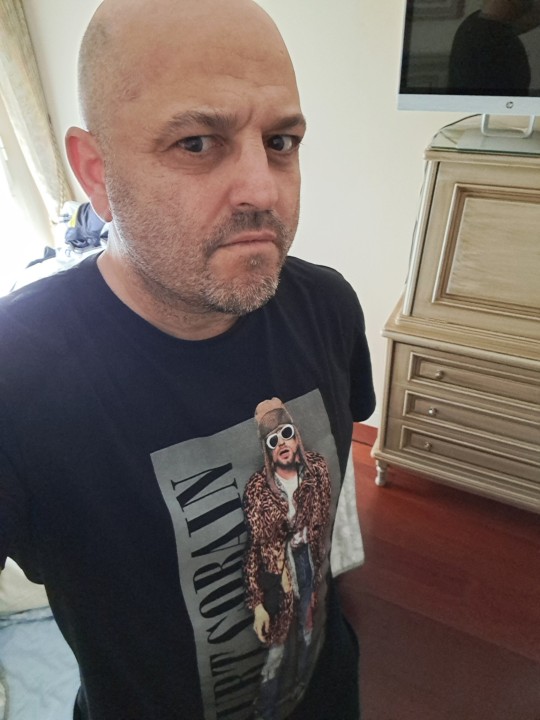
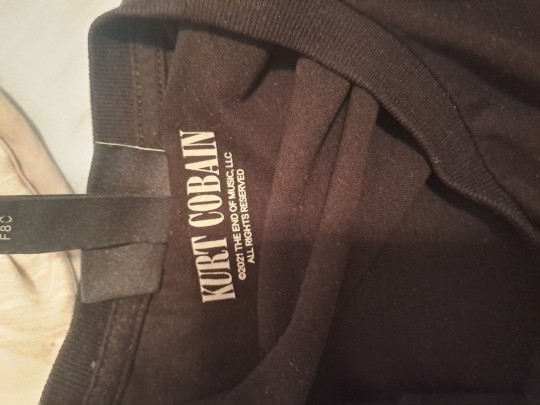
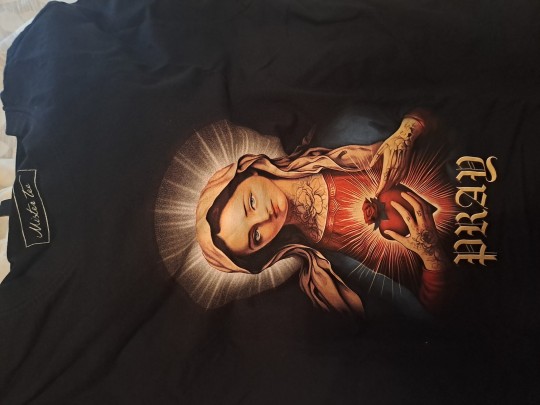
1 note
·
View note
Text
Navigating the Landscape of HVAC and Plumbing Services
Finding a reliable HVAC company near you can be a grueling task. The process involves sifting through a labyrinth of options while ensuring that they offer the services you require, such as furnace installation and maintenance or air conditioning installation and maintenance. These heating, ventilation, and air conditioning tasks are crucial to maintaining comfort in your home, particularly during those seasonal transitions when you depend on your home's internal climate.
Seeking Quality Furnace Install & Maintenance
Furnaces are integral to providing warmth during the coldest months of the year. With this need comes the requirement for regular maintenance to ensure your furnace performs optimally when you need it most. A local HVAC company can provide skilled furnace installation and routine maintenance. They can identify potential issues early on, and conduct necessary repairs, or replacements before they become costly or even dangerous problems.
Importance of Air Conditioning Install & Maintenance
Similarly to furnaces, air conditioners also require regular maintenance checks. Especially if you live in areas with scorching summers, where an effective AC system is not just a luxury but a necessity for maintaining comfort at home or work. Your local HVAC company will also undertake these services to ensure consistent cooling in extreme weather conditions.
Comprehensive Plumbing Solutions Offered By Local HVAC Companies
Contrary to popular belief, many local HVAC companies also offer plumbing services. Plumbing plays a vital role in everyday life and contributes significantly to household convenience. From fixing leaks to unclogging drains or installing new plumbing infrastructure in your kitchen or bathroom remodels - professionals handling this area bear an immense responsibility for the convenience factor at our homes.
Why Look For An All-Round Service Provider?
When relying on an all-around network of service providers like a versatile HVAC Company for both your heating, cooling, and plumbing needs, you are essentially streamlining your home maintenance tasks. It means less scheduling, fewer surprise visits, and a guarantee of a working relationship built on trust and recognition.
The Next Steps
Having recognized the benefits of having an umbrella HVAC company near me that can cater to multiple aspects of domestic repair and maintenance - the next logical step is taking the time to research various service providers. Seek out companies known for reliability, high-quality services, and exceptional customer care. Nothing beats first-hand testimonials from residents who have tried and tested these services.
In conclusion, establishing a relationship with a trusted HVAC company near you for furnace installation & maintenance, air conditioning installation & maintenance, plus plumbing solutions provides peace-of-maintenance-mind to any homeowner. From being proactive about heating and ventilation to managing unexpected plumbing troubles—having an all-around service provider ensures that you will have efficient access to help whenever you need it. Be sure to do your due diligence wisely when selecting this go-to provider because while there is no shortage of options in the market—the right fit would inevitably depend on individual-specific needs.
Business Name: HOME Heating, Cooling, and Plumbing LLP Address: 1231 Halls Corners Rd, Attica, NY, 14011 Phone: 585-501-3808
#Heating Repair Companies Attica#Heating Repair Services Attica#Attica HVAC Company#Attica HVAC Repair Contractors#HVAC Repair Contractors Attica
1 note
·
View note
Video
youtube
Betrayal at Attica: NY Violently Crushed Attica Prison Uprising Amid Negotiations & Covered It Up.
Democracy Now!
0 notes
Link
“We are men! We are not beasts and we do not intend to be beaten or driven as such. The entire prison populace, that means each and every one of us here, have set forth to change forever the ruthless brutalization and disregard for the lives of the prisoners here and throughout the United States.
What has happened here is but the sound before the fury of those who are oppressed. We will not compromise on any terms except those terms that are agreeable to us.
We've called upon all the conscientious citizens of America to assist us in putting an end to this situation that threatens the lives of not only us, but of each and every one of you, as well.”
- Declaration to the People of America, Read by Elliott James "L.D." Barkley, September 9, 1971
#attica#prison#riot#prisoner's rights#ny#nelson rockefeller#prison industrial complex#human rights#50 years ago today
16 notes
·
View notes
Text
Wake Up - Introduction

Edén apretó el volante del automóvil con mas fuerza sin darse cuenta. Las imágenes de su familia se mezclaban en su mente con un desazón extraño. Impropio de sus visitas a Attica. El viaje era mucho mas largo y cansador manejando, pero prefería manejar horas y horas antes de subirse a un avión. El pánico que la asediaba al pensarse volando en las alturas sin ningún tipo de control era inaguantable. Normalmente, hacer un viaje de automóvil a esta altura del año era un verdadero festín visual. El otoño del noreste se caracterizaba por la viveza de sus colores; rojos, cafés, naranjos y amarillos. Pero esta vez, el paisaje no le llamaba la atención. Se sentía en un trance, conduciendo sobre las carreteras de memoria. El móvil sonó, un mensaje de Ariel. “Mañana” Decía simplemente. Era la respuesta a su pregunta de “cuando salían de New York?” De Matty aun no había escuchado mas, pero sabia que llegaría de alguna forma. Aliviada pensando que el hecho de que no le hubiera aceptado su ofrecimiento de dinero solo podía significar algo bueno. Edén nunca tenia problema en dárselo cuando el se lo pedía, pero si su hermano no lo aceptaba era porque las cosas estaban mejor para el en lo financiero. Eden sonríe al solo pensar en su ‘hermanito’ menor. El cielo se nublo, pero ella no se dio cuenta. Una vez mas, repasaba el momento de la llamada. Encorvada hacia adelante frente a una pantalla, observando una y otra vez las líneas que denotaban lo infructuoso de sus intentos. El laboratorio de la Universidad estaba vacío. 8.39 pm de un Viernes; ni siquiera en MIT los prodigios se exigían tanto. Pero Eden Bishop era la única razón de las luces aun encendidas en la sala del reactor. Algo no estaba bien en la reacción y sabia, no se iría a casa hasta descubrirlo. La pantalla del móvil se ilumino en silencio. “Lucca llamando” El mensaje y la luz duraron algunos instantes hasta que volvió a oscurecerse, agregando un numero mas a “Llamadas perdidas” Sus labios ligeramente separados en un gesto de concentración, sus ojos fijos en el monitor; no hay un ruido en la habitación. De pronto… Eden siente como si alguien hubiese golpeado su pecho tan fuerte que todo el aire de sus pulmones sale inmediatamente de su cuerpo. Su corazón late rápidamente frente a aquella imprevista reacción. Sus ojos por fin se despegan de la pantalla para aterrizar en su móvil sobre el escritorio. Aun tratando de respirar profundo una y otra vez, lo toma entre sus manos para observar la lista de llamadas perdidas. Pasa de largo sobre “Lucca” para detenerse en dos de Ariel, con media hora de distancia entre ambas. La ultima… 20 minutos atrás. “Llamame” un mensaje de la joven. Sin puntos de exclamación ni emoticones; inusual en ella. La castaña se pone de pie nerviosa mientras busca el numero de su hermana. “Birdie.. estas bien?” Dice al momento de escuchar la voz de Ariel, escuchando atenta. Ante las palabras de su hermana, Eden siente de pronto la imposibilidad de mantenerse en pie; la gravedad parecía haber aumentado de manera sobrenatural… La sensación de falta de aire volvia, esta vez para quedarse por días… Su padre estaba muerto.
1 note
·
View note
Text
click the header to see the entire photoset, which explains what happened on which days and why.
One of the many guards beaten by inmates on the first day of the riots is loaded into an ambulance by New York State Police troopers and local police.This is a part of americas bloody history that they want to quietly disappear.
AMERICA YOU DID THIS..


Inmates raise their fists in solidarity while one of their leaders speaks with Commissioner of Corrections Russell Oswald on September 10, 1971.
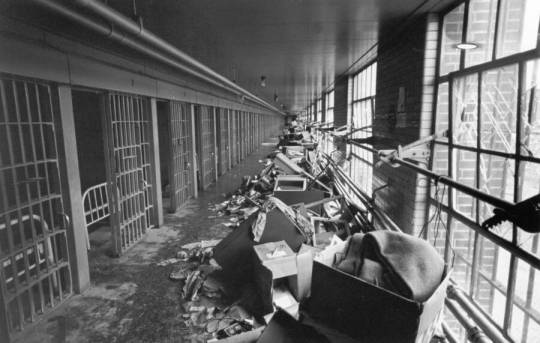
A debris-riddled corridor in one of the four Attica cell blocks is littered with shattered glass and broken equipment on the second day of the riot.
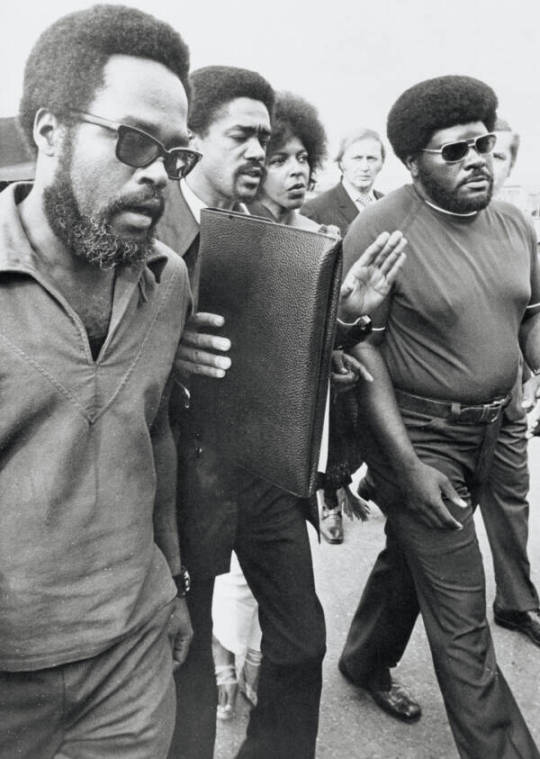
Black Panther Party co-founder Bobby Seale (second from left) arriving at the Greater Buffalo International Airport on September 11, 1971. After meeting with Attica inmates, he proposed accepting the deal put forth by the Commissioner of Corrections — which would have granted the prisoners 28 of their 33 demands.
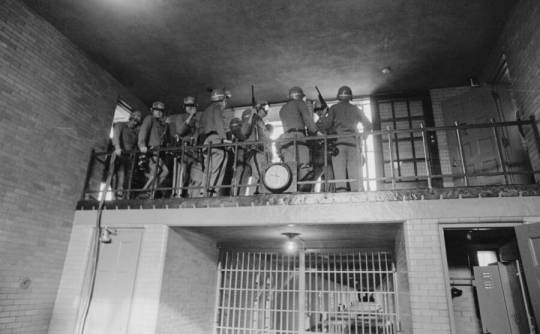
Heavily armed authorities position themselves on a platform overlooking Attica's D Yard — which had become the main stronghold of the 1,281 rioting inmates.
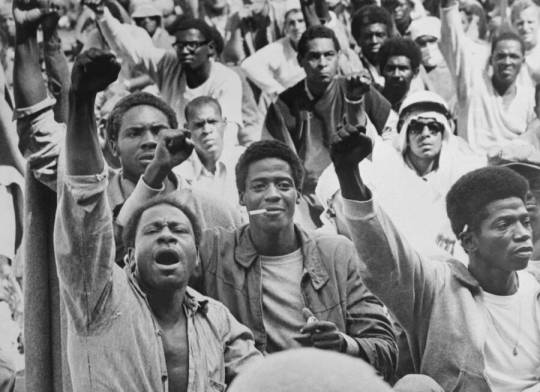
Inmates had drawn up a manifesto listing 33 demands, from better living conditions to amnesty for the uprising. They elected five prisoners to serve as leaders with negotiating powers, while many others were instructed to work as security or medics. Here, they express solidarity during the negotiation process.
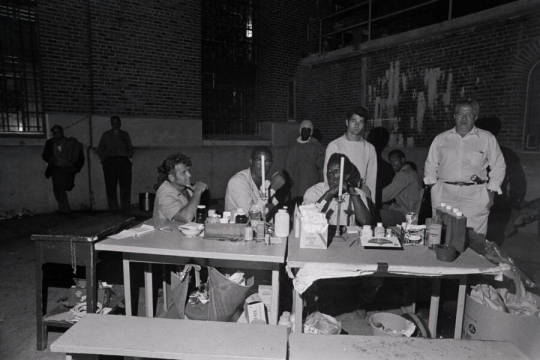
This makeshift hospital station was one of the internal services that prisoners set up during the riot. These services would be widely documented by journalists who were invited into the prison to oversee the uprising.

Inmates barricading themselves in one of the corridors leading to cell block D on September 10, 1971. They had just finished discussions with correctional officers regarding the terms of their impending negotiations. The figure in black standing in the center was one of the television cameramen that inmates allowed into the prison to document events.
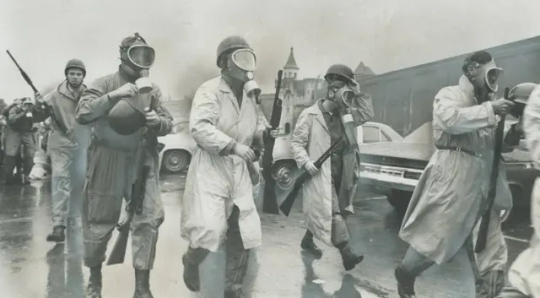
National Guardsmen donning gas masks as they prepare to storm the facility on September 13, 1971. Protected from the tear gas that had been delivered via helicopter, they would brazenly open fire on both inmates and hostages in the yard.

One of the military helicopters flying over the prison's D Yard to deploy tear gas. Moments later, hundreds of troops, officers, and guards would storm the prison, firing off rounds with abandon — and killing 10 of their own men in the process.
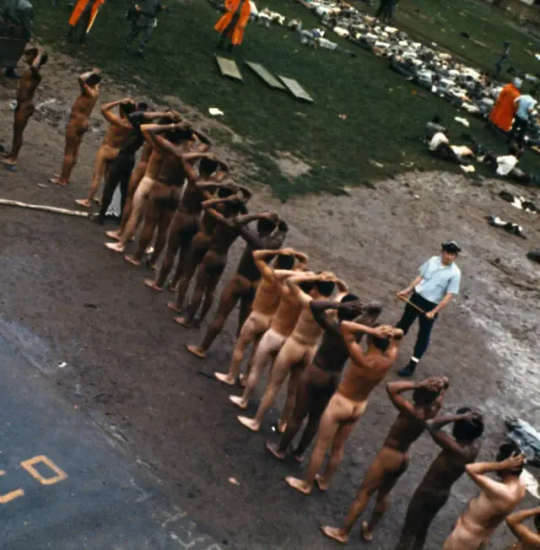
The immediate aftermath of the riots saw inmates stripped of their clothes and forced to stand with their hands above their heads. A week after the riot had ended, inmates were allegedly beaten by the guards. The McKay Commission used this image during their four-day hearings on the fiasco
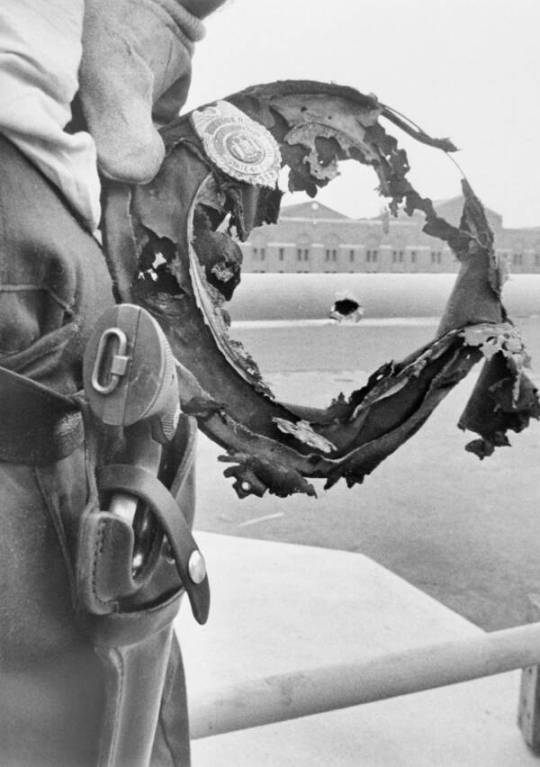
The charred hat of an Attica prison guard — and a bullet hole in the railing enclosing the D Yard.
#33 Pictures Of The Bloody Attica Prison Riot That Left 43 People Dead#attica prison massacre#attica prison#ny#rockerfeller#prison rights#prison and corrections in america#human rights
13 notes
·
View notes
Link
#prison escapes#sweat david p 1980#attica correctional facility#clinton correctional facility#corrections department nys#dannemora ny
1 note
·
View note
Link
3 notes
·
View notes
Photo

TrackList: 01. Oliver Nelson - Stolen Moments 8:46 02. John Coltrane Quartet - Greensleeves 10:00 03. Art Blakey - Alamode 6:51 04. Max Roach, Carlos "Potato" Valdez, Carlos "Totico" Eugenio - Garvey's Ghost (Feat. Carlos "Potato" Valdez, Carlos "Totico" Eugenio & Abbey Lincoln) 7:52 05. John Coltrane Quartet - Spiritual (Live At The Village Vanguard, New York/1961) 13:32 06. Quincy Jones And His Orchestra - Quintessence 4:20 07. Benny Carter And His Orchestra - Crazy Rhythm 3:24 08. Mccoy Tyner Trio - Inception 4:28 09. Roy Haynes Quartet - Snap Crackle 4:12 10. Freddie Hubbard - Caravan 7:29 11. Coleman Hawkins - Samba Para Bean 5:26 12. Duke Ellington, John Coltrane - My Little Brown Book 5:22 13. John Coltrane Quartet - Say It (Over And Over Again) 4:19 14. Charles Mingus - Track A - Solo Dancer (Stop! Look! And Listen, Sinner Jim Whitney!) 6:39 15. Freddie Hubbard - Chocolate Shake 3:57 16. John Coltrane, Johnny Hartman - Lush Life 5:30 17. John Coltrane - I Want To Talk About You (Live At Birdland Jazzclub, New York City, Ny/1963) 8:11 18. Sonny Stitt, Paul Gonsalves - Salt And Pepper 7:49 19. Charles Mingus - Theme For Lester Young 5:51 20. Chico Hamilton - Forest Flower 10:36 21. Lorez Alexandria - I've Grown Accustomed To His Face 4:04 22. Ben Webster - Someone To Watch Over Me 4:29 23. John Coltrane Quartet - Wise One 9:04 24. Yusef Lateef - Sister Mamie (Live At Pep's Lounge, Philadelphia / 1964) 5:27 25. Archie Shepp - Naima 7:10 26. John Coltrane - A Love Supreme, Pt. I – Acknowledgement 7:43 27. Shirley Scott, Stanley Turrentine - Rapid Shave (Live At The Front Room, New Jersey/1964) 8:28 28. Sonny Rollins - Three Little Words 6:57 29. Yusef Lateef - First Gymnopedie 3:28 30. Pee Wee Russell - Ask Me Now! 2:28 31. Sonny Rollins - Alfie's Theme (From "Alfie" Score) 9:46 32. John Coltrane - Offering 8:27 33. Yusef Lateef - (I Don't Stand) A Ghost Of A Chance With You 4:04 34. Gabor Szabo - Gypsy Queen 5:14 35. Clark Terry, Chico O'farrill - Spanish Rice 2:44 36. Oliver Nelson - Sound Piece For Jazz Orchestra 9:38 37. Chico Hamilton - Larry Of Arabia 5:09 38. Archie Shepp - Mama Too Tight 5:26 39. Pharoah Sanders - Upper Egypt & Lower Egypt (Medley) 16:16 40. Albert Ayler - Our Prayer (Live At The Village Vanguard/1966) 4:46 41. Alice Coltrane - Gospel Trane 6:48 42. Elvin Jones, Richard Davis - Raunchy Rita 11:32 43. Albert Ayler - Bells 3:09 44. Archie Shepp - Sophisticated Lady 7:11 45. Pharoah Sanders - The Creator Has A Master Plan (Edit) 9:07 46. Charlie Haden - War Orphans 6:43 47. Ahmad Jamal - Dolphin Dance 5:09 48. Alice Coltrane, Pharoah Sanders - Journey In Satchidananda (Feat. Pharoah Sanders) 6:40 49. Pharoah Sanders - Astral Traveling 5:48 50. Michael White - The Blessing Song 6:15 51. Archie Shepp - Attica Blues 4:48 52. Keith Jarrett - Fort Yawuh (Live At The Village Vanguard/1973) 11:14 53. Gato Barbieri - India 8:56 54. Dewey Redman - Boody 12:05 55. Sam Rivers - Tranquility 8:58 56. Marion Brown - Maimoun 7:34 57. John Handy - Hard Work 6:58 58. Alice Coltrane - This Train 6:07 59. John Coltrane - Untitled Original 11386 8:43 60. The Comet Is Coming - Unity 4:14
2 notes
·
View notes
Photo

On the afternoon of December 8th, 1980, outside his apartment in New York, John Lennon was approached by an autograph hunter who silently handed him a copy of Lennon’s album, Double Fantasy, to sign. Lennon obliged. In roughly the same area just a few hours later, that same man, Mark Chapman, shot John Lennon four times in the back, killing him, and then waited for the police to arrive. Six years later, while incarcerated at Attica Correctional Facility in New York, Lennon’s killer wrote a letter to a memorabilia expert with a question:
April 10, 1986 THURSDAY
Dear [redacted]
First, I’d like you to keep this letter confidential – between us only. Thank you.
I heard you today on Andy Thomas’s BUFFALO TALKS (WWKB) and felt at least from your voice, I could write you concerning a very personal matter. I also have some random questions which will follow.
On December 8, 1980 I shot and killed John Lennon. Before this, earlier in the afternoon, I had asked him to sign his Double Fantasy album. He did this also signing the date: 1980. I then placed this album behind the security guard’s booth where it was found after my arrest. I have tried unsuccessfully for years (and 2 attorneys) to get this item back, seeking to place it at auction and donating the money to a children’s charity. I felt it was the least I could do. Now, is there any way to assess the value of an item such as this? I have often wanted to write a dealer (Charles Hamilton comes to mind) concerning this but haven’t. I guess listening to you convinced me I could trust you ��� I’m somewhat of a recluse.
Is there a value that could be assigned to an item like this? Is this something that could only be determined at auction? Please let me know your feelings on this.
I have an autographed Autobiography of Sophie Tucker (it’s inscribed) and was wondering if this is worth anything. There is NO dust wrapper and the condition isn’t that great.
Also, do you have any Stephen King holograph material available? What is the worth of such items?
Any J.D. Salinger letters available? I would like any holograph letters.
Could you send me any addresses of other dealers who might have any of the above items?
Thank you Kindly,
(Signed)
M.CHAPMAN 81 A 3860 BOX 149 ATTICA CORRECTIONAL FACILITY ATTICA, NY 14011
#mark chapman#john lennon#letter#handwriting#music memorabilia#memorabilia#crime#true crime#1980s#80s#1986#I feel bad acknowledging him almost...
12 notes
·
View notes